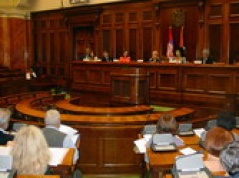National Assembly of the Republic of Serbia / Activities / Activity details

Thursday, 28 May 2009
Eleventh Sitting of the Culture and Information Committee
At the sitting held on 28 May, in the form of a public hearing, the Culture and Information Committee discussed the Culture Bill.
At the sitting held on 28 May, in the form of a public hearing, the Culture and Information Committee discussed the Culture Bill. The sitting was chaired by Vesna Marjanovic, Committee Chairperson.
Opening the discussion on the Bill, the National Assembly Speaker, Prof. Dr Slavica Djukic-Dejanovic, stressed that the discussion was organized so that the deputies might hear the opinions and views of the representatives of cultural institutions, art associations and artists themselves on the proposed regulations and expected effects on Serbian Culture. The public hearing is to serve as preparation for the discussion in principle and possible amendments.
The National Assembly Speaker said that the Bill would regulate all cultural fields in a unique manner and improve the position of all cultural workers, from the republic to the local self-government level.
She particularly emphasised that the new law envisages the allocation of
Committee member Gorica Mojovic, moderator of the sitting, pointed out the importance of the systemic law and reminded those present that the culture draft law had been prepared by the Ministry of Culture in 2007 after which it was subjected to public debate where it underwent considerable changes. The Serbian Government formulated the Bill two weeks ago and forwarded it into assembly procedure for adoption.
The representative of the Ministry of Culture stated that the law will come into force three months after adoption, a period in which 12 by-laws specifying some of the areas the law regulates should also be passed.
The participants of the hearing stressed that the law should list cultural institutions of definite national importance thus enabling other institutions to gain the same status when they have fulfilled certain criteria. They mostly objected to the composition of the National Culture Council introduced by the law, whose members are to be elected by the National Assembly, at the Government’s proposal. According to the proposed regulation, the council should comprise representatives of the Government,
The representatives of cultural institutions believe that the composition of this advisory body should be determined by cultural workers who are, according to the current proposal, the least represented in the composition of the National Council.
During the discussion, it was requested that the relation between the director of a cultural institution and the administrative board, which is more important than the director, be specified and to determine who has the right to be part of the administrative board. That would, it was deemed, help achieve administrative board functionality and efficiency.
The participants of the public hearing stated the opinion that the strategy of cultural development must be passed for longer than three years, which was estimated too short a period. They also criticized the provision which allows full employment only to artists with more than 20 years of service, it was said that there should be no exceptions and that the law is unclear on who should decide on it.
On the behalf of the Hungarian Ethnic Minority National Council, deputy Laszlo Varga said that this institution has only a partial right to manage cultural institutions in communities where this ethnic minority is predominant and that this solution is a step backwards compared to common practice in Vojvodina.
In addition to these, several other objections and suggestions to the Culture Bill were also voiced, but the participants of the gathering were unanimous in their estimate that the Bill should be passed as soon as possible.
At the end of the discussion it was agreed that another Committee sitting in the form of a public hearing be held on the Bill at the beginning of June.
Representatives of the Ministry of Culture, managers and directors of the most important cultural institutions in

